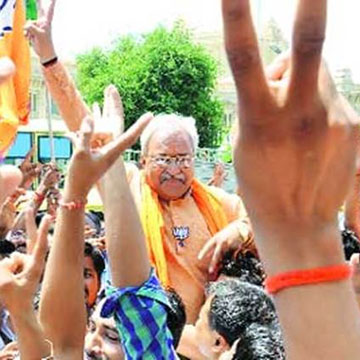 Hastinapur:
Hastinapur: Located to the west of the Ganga, this legendary capital of the Kauravas in the Mahabharata may have lost much of its glory, but it has earned a reputation as a bellwether constituency indicating who will rule Uttar Pradesh.
For several years after Independence, Hastinapur's seat -- and the state -- went to the Congress. But later, it also elected candidates from the Bharatiya Kranti Dal (BKD), Janata Party, Janata Dal, Samajwadi Party (SP) and Bahujan Samaj Party (BSP).
Most of the time, the winning candidate's party was elected to rule the state, giving Hastinapur, in Meerut district, the stature of a somewhat prescient constituency.
And locals are quick to point out, tongue firmly in cheek, that when Hastinapur in 1996 elected an independent candidate, Atul Kumar, no party got an absolute majority, forcing imposition of President's Rule for some months.
That, however, was not unusual for the state through much of the 1990s.
Locals say this time the fight in the constituency -- as in the state -- is triangular, with the SP-Congress alliance, the Bharatiya Janata Party (BJP) and the BSP slugging it out.
The ruling SP has fielded its sitting MLA Prabhu Dayal Balmiki, who is facing some anti-incumbency heat. He first won from here in 2002 and, in the 2012 polls, emerged victorious by a narrow margin of 6,641 votes over Yogesh Verma, then a candidate of the Peace Party.
Verma, who won the seat in 2007 as a BSP candidate, has since rejoined the party and is its nominee for the seat.
The BJP has fielded Dinesh Khatik, a young candidate who is hoping to ride on the charisma of Prime Minister Narendra Modi. The BJP had finished fifth in the constituency in the 2012 assembly polls but had remarkably improved its position in the 2014 Lok Sabha polls, getting the maximum votes from this assembly segment.
Hastinapur is the only reserved constituency in Meerut district and will vote on February 11 in the first phase of Uttar Pradesh's seven-phased election.
"It's a tough election this time. I can't say which party will emerge victorious here, but the fight is between BSP, BJP and SP," Sachin Kumar Prajapati, 28, an engineer, told IANS.
He, however, added that the BSP's Verma was the most accessible of the candidates of the three main parties.
Dinesh Kumar, 35, who works at a medical store, said, "The government should be changed every five years. I will vote for change." Kumar, however, said he was not against Chief Minister Akhilesh Yadav. "He has carried out development works though not in Hastinapur," Kumar added.
Asked about the impact of demonetisation of Rs 500 and Rs 1,000 notes, he said it had hit the businesses and livelihoods of many.
Hastinapur has an estimated 300,000 voters with Muslims and Gujjars being the two main communities. Dalits too have a considerable presence.
Hasrat Ali, a resident of the town, said minority community members are yet to make up their mind. "They have not yet decided whether to go with the SP or with BSP. If the situation persists, it will help the BJP," he said.
Hastinapur elected a non-Congress candidate for the first time in 1969. The BKD won here and also ascended to power in Lucknow. The Congress regained the seat in 1974 and the party returned to power.
The Congress lost the seat in the Janata Party wave of 1977 and the state saw a government led by Ram Naresh Yadav of that party. He later joined the Congress. In 1980 and 1985, the Congress won the seat and saw a string of party leaders becoming Chief Ministers for brief tenures -- V.P. Singh, Sripati Mishra, N.D. Tiwari twice, and Vir Bahadur Singh.
In 1989 the seat went to the Janata Dal and Mulayam Singh Yadav became the state's Chief Minister for the first time that year.
Much of the 1990s was a period of ferment in Uttar Pradesh and saw Mulayam Singh's second tenure (1993), several BJP Chief Ministers (Kalyan Singh, Ram Prakash Gupta, Rajnath Singh), and the rise of Mayawati, who became Chief Minister twice (1995 and 1997).
It was during this period of turmoil that Hastinapur turned to its lone independent legislator.
In more recent times, as politics in the state became more stable, the SP's Balmiki won the seat in 2002. Though Uttar Pradesh saw the formation of a BSP-BJP government for over a year (Mayawati's third stint as Chief Minister), the SP eventually returned to power under Mulayam Singh.
The BSP won the seat in 2007 and Mayawati became Chief Minister for her fourth term. In 2012, Hastinapur re-elected Balmiki and the SP formed a government in Uttar Pradesh with Akhilesh Yadav as Chief Minister.
So which way does the wind blow from Hastinapur to Lucknow? The constituency seems to be keeping its cards close to the chest, making the game of thrones in Lucknow more interesting.
 Hastinapur: Located to the west of the Ganga, this legendary capital of the Kauravas in the Mahabharata may have lost much of its glory, but it has earned a reputation as a bellwether constituency indicating who will rule Uttar Pradesh.
Hastinapur: Located to the west of the Ganga, this legendary capital of the Kauravas in the Mahabharata may have lost much of its glory, but it has earned a reputation as a bellwether constituency indicating who will rule Uttar Pradesh.